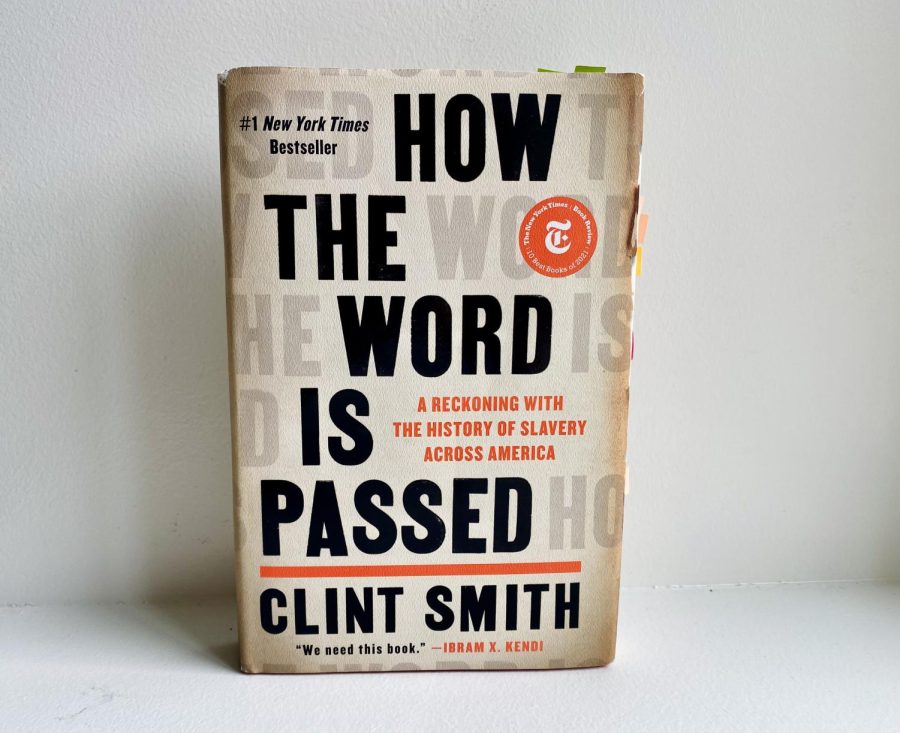Common theme invites us to reckon with the history of slavery in America
Every year, the faculty at St Edward’s University selects a common read for the incoming freshman class. The freshman seminar professors incorporate the book into the syllabus and class discussions. The themes vary from year to year, and past books focused on everything from algorithms to immigration. This year, the theme is “reckoning with the history of slavery across America.”
The nonfiction book is titled “How the Word is Passed” and follows author Clint Smith as he travels across the U. S. visiting significant historical sites with connections to slavery. His conversations with various curators, tour guides and fellow visitors illuminate how differently we have reckoned with slavery as a nation and as individuals.
Over the course of several years, Smith traveled to different parts of the country that have historical ties to slavery like plantations, historical reenactments and penitentiaries. At each of these sites, Clint took the time to converse with others, whether they were professionals or visitors. Through these conversations, as well as the author’s recollection of his subsequent internal dialogue, the reader is able to witness Clint’s emotional reactions as a Black American.
One of the most moving passages in the book describes Clint’s experience encountering confederate memorabilia. Black people have a very different experience when it comes to rememberances of slavery. For white people, it can simply be “a piece of history” or just a statue. For Black people in America, it is a reminder of generations of pain and tribulation. Clint recounts, “everytime I returned home I would drive on streets named for those who thought of me as chattel.”
The book addresses how the word is passed by both white and Black people. For Black Americans, there is a strong tradition of oral history and storytelling, namely because very few slaves were permitted to become literate. As such, a tradition of history being passed from mouth to mouth rather than from pen to paper developed. At Monticello, the Thomas Jefferson Memorial Foundation has collected and preserved the stories of former slaves on the plantation as part of their “Getting Word” oral history project.
For white people, though a majority of their ancestors were likely literate, there is also a tradition of oral history. Many of the white people that Clint spoke with told him about the narratives that have been passed down in their family for generations: narratives that shaped the way they viewed the Confederacy and their ancestors’ roles in the war. Many claimed the war was not about slavery, and their ancestors had been poor townsmen, not slaveowners. For many, the connection of their lineage seemed to be “central to how (they) thought about the war and what it represented.”
In service of the university’s diversity, equity, inclusion and justice (DEIJ) goals under Strategic Plan 2027, the board of trustees recently renamed former Doyle Hall to Equity Hall. St. Edward’s is working to foster “an environment where students, faculty, staff, leadership and alumni experience a sense of belonging, actively participate in a culture of inclusion and are individually responsible for building and maintaining a community where different perspectives are respectfully heard.” Equity Hall is set to become the epicenter of diversity, equity, inclusion and justice on campus.
Given the university’s new DEIJ goals under President Fuentes, the selection of this year’s common theme makes perfect sense. It’s important our students are exposed to this knowledge. Only approximately five percent of the student population is Black, and many students have never experienced the emotional turmoil Clint describes. It’s necessary for St. Edward’s to make every attempt to curate safe and inclusive spaces on campus, which includes educating its students on the uncomfortable truths.
I think many people, regardless of political or moral beliefs, are ignorant to the lived realities of Black people in this country. As a white person, it is easy to move though the world without particularly noticing the remnants of slavery. It is easy to fall into ignorance. This book allows us to bear witness to Clint’s emotional experiences that accompany every Confederate statue and every insensitively-named street. I implore you, bear witness.

Sienna is a senior Writing & Rhetoric major with a concentration in creative writing. This is their third year with "Hilltop Views" and fourth semester...







